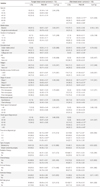Abstract
Purpose
The aim of this study was to analyze the differences in psychosocial adjustment between younger (age≤50) and older (age>50) breast cancer survivors, and to explore the role of sociodemographic and disease-related variables in predicting psychosocial adjustment between younger and older breast cancer survivors.
Methods
A total of 262 women participated in this study. A self-reported questionnaire, the Psychosocial Adjustment to Illness Scale-Self Report Korean version (PAIS-SR Korean version), was used. Data were analyzed with SAS/WIN 9.1 for descriptive statistics using the t-test, ANOVA, and stepwise multiple regression.
Results
The psychosocial adjustment score of younger breast cancer survivors was significantly higher than that of older breast cancer survivors. Significant predictors influencing psychosocial adjustment in younger breast cancer survivors were marital state, menopausal cause, immune therapy, and self-help group, and these predictors account for 48% of the variance in psychosocial adjustment. Significant predictors influencing psychosocial adjustment in older breast cancer survivors were stage of cancer, monthly income, marital state, and menopausal cause. These predictors accounted for 35% of the variance in psychosocial adjustment.
Figures and Tables
Table 1
Psychosocial Adjustment of Breast Cancer Survivors according to Sociodemographic and Disease-related Characteristics (N=262)

Table 2
Differences of Psychosocial Adjustment between Younger and Older Breast Cancer Survivors (N=262)

References
1. National Cancer Information Center. National cancer statistics. Accessed January 20, 2012. http://www.cancer.go.kr/ncic/cics_b/01/013/1268116_5873.html.
2. Kirsner RS, Ma F, Fleming LE, Federman DG, Trapido E, Duncan R, et al. Earlier stage at diagnosis and improved survival among medicare HMO patients with breast cancer. J Womens Health (Larchmt). 2010. 19:1619–1624.

3. Axelrod D, Smith J, Kornreich D, Grinstead E, Singh B, Cangiarella J, et al. Breast cancer in young women. J Am Coll Surg. 2008. 206:1193–1203.

4. Baucom DH, Porterb LS, Kirbya JS, Gremorea TM, Keefeb FJ. Psychosocial issues confronting young women with breast cancer. Breast Dis. 2005-2006. 23:103–113.

5. Sammarco A. Quality of life of breast cancer survivors: a comparative study of age cohorts. Cancer Nurs. 2009. 32:347–356.
6. Avis NE, Crawford S, Manuel J. Psychosocial problems among younger women with breast cancer. Psychooncology. 2004. 13:295–308.

7. Bloom JR, Stewart SL, Chang S, Banks PA. Then and now: quality of life of young breast cancer survivors. Psychooncology. 2004. 13:147–160.

8. Kornblith AB, Powell M, Regan MM, Bennett S, Krasner C, Moy B, et al. Long-term psychosocial adjustment of older vs younger survivors of breast and endometrial cancer. Psychooncology. 2007. 16:895–903.

9. Fobair P, Stewart S, Chang S, D'Onofri C, Banks PJ, Bloom JR. Body image and sexual problems in young women with breast cancer. Psychooncology. 2006. 15:579–594.

10. Arndt V, Merx H, Stürmer T, Stegmaier C, Ziegler H, Brenner H. Age-specific detriments to quality of life among breast cancer patients one year after diagnosis. Eur J Cancer. 2004. 40:673–680.

11. Perkins EA, Small BJ, Balducci L, Extermann M, Robb C, Haley WE. Individual differences in well-being in older breast cancer survivors. Crit Rev Oncol Hematol. 2007. 62:74–83.

12. Ganz PA, Guadagnoli E, Landrum MB, Lash TL, Rakowski W, Silliman RA. Breast cancer in older women: quality of life and psychosocial adjustment in the 15 months after diagnosis. J Clin Oncol. 2003. 21:4027–4033.

13. Tribus S, Alberti F, Fehlauer F. Age-a factor quality of life in long-term breast cancer survivors. Poster presented at: The 44th Annual ASTRO Meeting. 2002 Nov:5-9; New Orleans, USA.
14. Dow KH, Lafferty P. Quality of life, survivorship, and psychosocial adjustment of young women with breast cancer after breast conserving surgery and radiation therapy. Oncol Nurs Forum. 2000. 27:1555–1564.
15. Friedman LC, Kalidas M, Elledge R, Chang J, Romero C, Husain I, et al. Optimism, social support, and psychosocial functioning among women with breast cancer. Psychooncology. 2006. 15:595–603.

16. Merluzzi TV, Sanchez MM. Factors structure of the psychosocial adjustment to illness scale (self-report) for persons with cancer. Psychol Assess. 1997. 9:269–276.

17. Shelby RA, Crespin TR, Wells-Di Gregorio SM, Lamdan RM, Siegel JE, Taylor KL. Optimism, social support, and adjustment in African American women with breast cancer. J Behav Med. 2008. 31:433–444.

18. Lee EH. Fatigue and hope: relationships to psychosocial adjustment in Korean women with breast cancer. Appl Nurs Res. 2001. 14:87–93.

19. Jun JY, Kim HJ. A study on body image, spouse support, and psychosocial adjustment of patients in mastectomy. J Korean Acad Adult Nurs. 1996. 8:394–409.
20. Parker PA, Youssef A, Walker S, Basen-Engquist K, Cohen L, Gritz ER, et al. Short-term and long-term psychosocial adjustment and quality of life in women undergoing different surgical procedures for breast cancer. Ann Surg Oncol. 2007. 14:3078–3089.

21. Derogatis LR, Lopez M. The Psychosocial Adjustment to Illness Scale: administration, scoring, and procedures manual. 1983. Baltimore: Clinical Psychometric Research.
22. Kim HY. A structural model for psychosocial adjustment in patients with early breast cancer [dissertation]. 2009. Gwangju: Chonnam National Univ..
23. Faul F, Erdfelder E, Buchner A, Lang AG. Statistical power analyses using G*Power 3.1: Tests for correlation and regression analyses. Behav Res Methods. 2009. 41:1149–1160.

24. Cho OH, Yoo YS. Psychosocial adjustment, marital intimacy, and family support of post-mastectomy patients. J Korean Oncol Nurs. 2009. 9:129–135.
25. Thewes B, Butow P, Girgis A, Pendlebury S. The psychosocial needs of breast cancer survivors; a qualitative study of the shared and unique needs of younger versus older survivors. Psychooncology. 2004. 13:177–189.

26. Kang MY. A subjectivity study on the meaning of the life of breast cancer survivors: focused on the participation of the support groups [dissertation]. 2009. Seoul: Hanyang Univ..
27. Stewart MJ. Professional interface with mutual-aid self-help group: a review. Soc Sci Med. 1990. 31:1143–1158.




 PDF
PDF ePub
ePub Citation
Citation Print
Print




 XML Download
XML Download